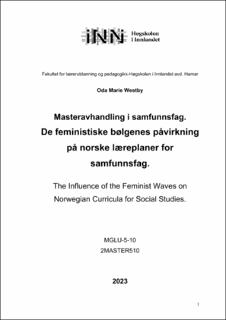| dc.description.abstract | Norsk sammendrag
Dette er en mastergradsoppgave i samfunnsfag ved Høgskolen i Innlandet. Oppgaven er en kvalitativ innholdsanalyse av de feministiske bølgene med tilhørende feministisk teori samt læreplanene fra 1994, 1997, 2006 og 2020. Jeg har lagt vekt på læreplanene i samfunnsfag, samfunnskunnskap og de generelle delene. Problemstilling lyder som følgende: På hvilken måte har de feministiske bølgene påvirket generell del og læreplanene for samfunnsfag både i norsk grunnskole og videregående skole? Formålet er å belyse denne relasjonen gjennom å undersøke og beskrive forholdet mellom de feministiske bølgenes kampsaker og de aktuelle læreplanene. Den metodiske tilnærmingen for undersøkelsen er kvalitativ innholdsanalyse. Jeg anså denne metoden som best egnet da jeg analyserer offentlige tekster. For å kategorisere funn fra læreplanene valgte jeg å telle fremkomsten av ulike nøkkelord og fraser som er relevante for problemstillingen. Nøkkelordene som ble brukt for å søke i læreplanene er: likestilling, kjønn/kjønnsroller, feminisme, likestillingsarbeid, kvinner, menn, jenter, gutter, likeverd, like rettigheter for alle, diskriminering og likestilling mellom menn og kvinner. Funnene gjort gjennom å analysere læreplanene etter nøkkelordene ble analysert opp mot liberalfeministisk teori, radikal feministisk teori, postmoderne feministisk teori og tidligere forskning. Funnene i oppgaven viser at de feministiske bølgenes kampsaker har hatt en viss påvirkning på læreplanenes innhold. Flere av funnene er knyttet til den tredje feministiske bølgens fokus på likhet for alle og den postmodernistiske feminismens fokus på at identitet skal kunne skapes selv og ikke være forutbestemt av tradisjoner og samfunnsforventninger. Det faktumet at flere av funnene tilhøre den tredje feministiske bølgen og postmodernistisk feministisk teori er ikke overrakende da den tredje feministiske bølgen foregår i samme periode som flere av de aktuelle læreplanene jeg har sett på har gyldighet. Det vil si fra 1990- tidlig 2000-tall. Et av de mest konkrete funnene fra dette studien er overgangen fra bruken av ordet likestilling til bruken av ordet likeverd. I løpet av den tredje feministiske bølgen endrer fokuset seg fra likestilling mellom kjønnene til likeverd mellom alle individer i samfunnet, uavhengig av hudfarge, etnisitet, kjønn, helse, seksuell orientering og lignende. Denne nye begreps bruken kommer også tydelig fram i læreplanene, spesielt i deres generelle del. Dette funnet er bare en av flere som er presentert i dette masterstudiet. Oppgavens funn blir naturligvis formet av de ulike teoriene jeg har valgt.
Det er derfor viktig å legge vekt på at det er mulig at annen teori kunne gitt en annen vinkling på funnene. | |
| dc.description.abstract | Engelsk sammendrag (abstract)
This is a master´s thesis in social science at the Innlandet University Collage. The thesis is a qualitative content analysis of the feminist waves, including feminist theory, and the curricula from 1994, 1997, 2006 and 2020. The focus is on the curricula for social studies, civic educations, and the general parts. The research question is: In what ways have the feminist waves influenced the general parts and curricula for social studies in Norwegian primary and secondary schools? The aim is to illuminate the relationship between these by examining and describing the connection between the themes in the feminist waves and the relevant curricula. The chosen methodological approach for the study is qualitative content analysis, which is considered most appropriate for analyzing public texts. To categorize the findings from the curricula, the occurrence of various keywords and phrases relevant to the research question were counted. The keywords used to search the curricula are: equality, gender/gender roles, feminism, gender equality work, women, men, girl, boys, equal worth, equal rights for all, discrimination and equality between men and women. The findings from the analysis of the curricula using the keywords were analyzed in relation to liberal feminism theory, radical feminist theory, postmodern feminist theory, and previous research. The study´s findings show that the themes in feminist waves have had some influence on the curricula´s content. Several of the findings are related to the third feminist wave´s focus on equality for all and postmodern feminist theory´s emphasis on creating identity independently and not being predetermined by traditions and social expectations. The fact that several of the findings belong to the third feminist wave and the postmodern feminist theory is not surprising since the third feminist wave occurred during the same period as several of the relevant curricula that were examined, which is from the 1990s to the early 2000s. One of the most concrete findings from this study is the transition from using the term “equality” to “equal worth”. During the third feminist wave, the focus shifted from gender equality to equal worth among all individuals in society, regardless of skin color, ethnicity, gender, health, sexual orientation, and similar factors. This new concept is also clearly reflected in multiple of the curriculums, especially in their general parts. This finding is just one of several presented in this master´s thesis.
The findings of the thesis are naturally shaped by the chosen theories. Therefore, it is essential to emphasize that other theories could have given a different perspective on the findings. | |
